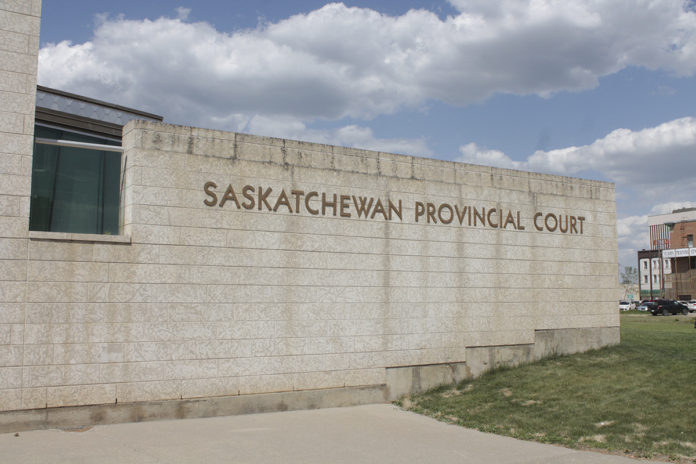Police officer’s contradictory testimony, failure to provide documents leads Judge Robinson to find evidence inadmissible
A former Prince Albert defence attorney arrested for drunk driving in 2017 was found not guilty of two charges related to the arrest in provincial court in March this year, after the judge ruled the evidence was inadmissible.
Legal aid defence lawyer Thomas Adam Masiowski was originally charged with impaired care or control of a motor vehicle and with having a blood-alcohol level over the legal limit of 0.80 (i.e. more than 80 milligrams of alcohol in 100 milliliters of blood).
Justice S.I. Robinson found Masiowski not guilty on both charges, because of inconsistencies and errors attributed to Const. Darryl Hickie, the officer who arrested Masiowski and charged him on the night of May 20, 2017.
The errors, according to Robinson’s ruling, stem from: Hickie’s inconsistent testimony about Masiowski’s alleged staggering and swaying while at the city’s police station; and a lack of certainty whether Hickie gave Masiowski and his defence lawyer a copy of a certificate verifying that the officer administering his breathalyzer tests at the station was qualified to do so.
The evidence presented to Robinson in provincial court showed that on the night of May 20 last year, Hickie pulled over Masiowski at a Mothers Against Drunk Driving stop check in the city. After Hickie gave Masiowski a breathalyzer test, he arrested him on the two charges and brought him to the city’s police station; he had Masiowski submit to two more breathalyzer tests at the station. Those two latter tests were administered by police constable Rob Lindsay.
For the first charge, that of impaired care or control of a motor vehicle, Robinson highlighted in his ruling that Hickie’s testimony contradicted video evidence presented at the trial.
“When they got to the police station, Constable Hickie noted that the accused had a slight sway and stagger as he walked through the police loading bay area leading to the stations’ interview area,” Robinson wrote in his ruling. “He also observed the accused stagger when he later moved from the station’s interview room to the breath testing room.”
But Robinson emphasizes that video recordings of Masiowski at the police station do “not disclose any sign of the accused either swaying or staggering.
“I am at a loss to understand why a senior police officer would both make false notes and give false testimony indicating that the accused had been staggering. While I am prepared to accept parts of Constable Hickie’s testimony, I am not at all impressed with his overall truthfulness,” the judge wrote.
Robinson writes that because the video essentially contradicts Hickie’s testimony, “I reject any suggestion that the accused was swaying or staggering at any time. I therefore find the accused not guilty on his charge of impaired care or control.”
The judge also said that the Crown presented “little evidence to suggest that the accused’s ability to operate a motor vehicle was impaired by alcohol.”
As for the second charge, that of Masiowski allegedly being over the legal blood alcohol content limit (0.80), Robinson found him not guilty because of a lack of clarity whether Hickie gave Masiowski a certificate verifying that Constable Lindsay has the adequate training and knowledge to administer the second and third breathalyzer tests at the P.A. police station.
When Lindsay administered the second and third tests on Masiowski, he obtained the following results: At 9:50 p.m., Masiowski showed a level 220 milligrams of alcohol in 100 milliliters of blood; at 10:11 p.m., he showed a level 210 milligrams of alcohol in 100 milliliters of blood.
According to Robinson’s ruling, it was incumbent on Hickie to provide Masiowski with a copy of the certificate verifying Lindsay’s qualification to run those tests.
The officer could have proved that he gave Masiowski the certificate by producing an affidavit testifying that the certificate was provided. The affidavit required Hickie’s signature and a signature of a taker of oaths.
However, during the trial and specifically during Hickie’s testimony, it was never made clear if the police constable gave Masiowski that certificate when he was at the police station on the night of May 20, 2017, Robinson ruled.
Furthermore, the affidavit was only half-completed: It contained Hickie’s signature, but not that of oaths, the judge ruled.
Therefore, the breathalyzer test results gathered by constable Lindsay are considered inadmissible evidence. That led Robinson to find Masiowski not guilty on the second charge.
“There is no straightforward statement from Constable Hickie that he signed the notice of intention to produce at the bottom of a true copy of the certificate of qualified technician and then gave that document to the accused,” Robinson wrote.
The judge also referenced the issue of the half-completed affidavit.
“By virtue of section 10 of Saskatchewan’s Commissioners for Oaths Act, 2012, c C-16.001, all police officers are commissioners for oaths able to take sworn affidavits. Constable Hickie would presumably have had ready access to a police officer able [sic] take his affidavit at the Prince Albert Police Service station,” Robinson wrote.
Masiowski could not be reached for comment.
The Prince Albert police service did not respond to the Daily Herald’s Thursday afternoon request for comment by press time.


